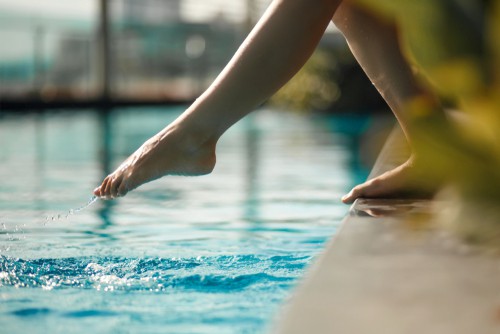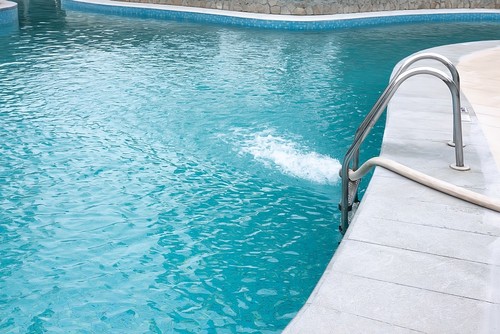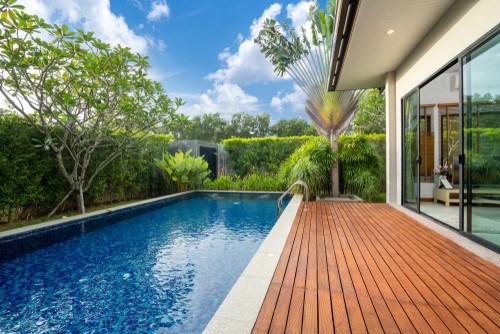
Troubleshooting Common Pool Cleaning Challenges
November 24, 2023
The Benefits of Owning a Swimming Pool: Health and Recreation
January 30, 2024Swimming Pool Pump Repairs: Signs, Maintenance, and Troubleshooting
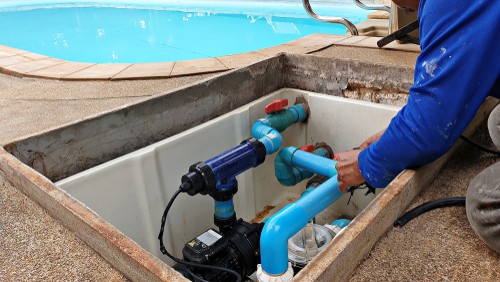
Swimming Pool Pump Repairs Signs, Maintenance, and Troubleshooting
Swimming Pool Pump Repairs: Signs, Maintenance, and Troubleshooting. The swimming pool pump stands as a cornerstone in maintaining the health and clarity of pool water.
Acting as the heart of the pool’s circulation system, it ensures that the water moves through the filter, where it gets purified and chemically balanced.
Maintaining a pool pump can be challenging, especially as it ages. Issues like clogging, motor failure, or wear and tear can significantly impact its performance.
This article aims to provide comprehensive insights into recognizing signs of pool pump problems, understanding the importance of routine maintenance, effective troubleshooting strategies, and the benefits of professional servicing.
The Importance of a Well-Functioning Pool Pump
Pool pumps are vital in maintaining water circulation, which is essential for keeping the pool water clean and safe.
The pump pulls water from the pool, sends it through the filter for purification, and then circulates it back into the pool.
A well-functioning pool pump is crucial for maintaining hygiene. It ensures efficient distribution of chlorine and other sanitizers throughout the pool, preventing algae growth and accumulation of debris.
The pool pump’s effectiveness directly influences water quality. It keeps the water moving, preventing stagnation, and ensuring a uniform distribution of chemicals, which is vital for a clean and healthy swimming environment.
Common Signs of Pool Pump Issues
Common indicators of pool pump issues include unusual noises, vibrations, leaks around the pump, a drop in water pressure, or the pump failing to start. These signs can point to various problems, from simple blockages to motor failure.
Pump malfunctions can lead to poor water circulation, resulting in cloudy water, inefficient filtration, and increased strain on other pool equipment. Inefficient circulation can also lead to chemical imbalances, making the pool unsafe for swimming.
Early detection and repair of pump issues are crucial to prevent more severe damage and costly repairs. Regular checks can help identify problems before they escalate, ensuring the pump operates efficiently and extends its lifespan.
Routine Maintenance for Pool Pumps
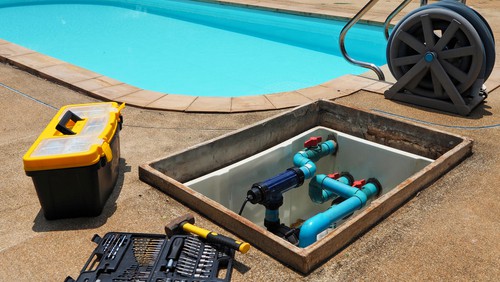
Regular Pump Maintenance
Routine maintenance is essential for the longevity and efficient operation of pool pumps. This includes regular cleaning of the pump basket, checking the pump seal for leaks, and ensuring the motor is functioning correctly.
Cleaning and Inspection
Cleaning the pump basket and strainer helps to prevent clogging, while inspecting the pump housing and motor for any signs of wear or damage can prevent more serious issues. Regular lubrication of the pump’s moving parts can also extend its operational life.
Replacement Schedules
Components like the pump seal, O-rings, and gaskets should be replaced periodically as part of preventive maintenance. Following the manufacturer’s guidelines for parts replacement can help maintain the pump’s efficiency and prevent leaks or failures.
Troubleshooting Pool Pump Problems
When troubleshooting pool pump problems, start by checking for clogs in the pump basket and impeller. Ensure there are no air leaks in the suction line and that the pump lid is securely fastened.
Common pool pump problems include air leaks, which can cause the pump to lose its prime, and clogs, which reduce water flow. Other issues may involve the pump’s electrical components, such as the capacitor or motor, which may need professional attention.
For complex problems, such as motor failure or electrical issues, professional assistance is recommended. Certified technicians can diagnose and repair these problems safely and effectively.
DIY vs. Professional Pool Pump Repairs
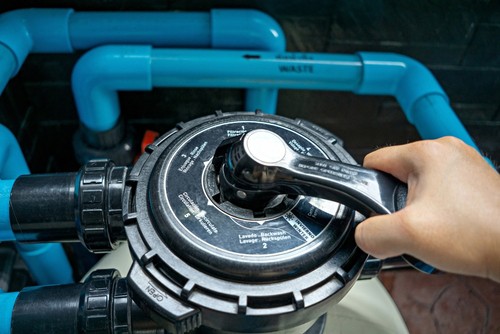
Basic pool pump maintenance, like cleaning the pump basket and checking for leaks, can be performed by pool owners. Simple preventive measures can often solve minor issues and extend the pump’s life.
Professional pool technicians have the expertise to handle complex repairs and can ensure that the pump is repaired safely and effectively. They can also provide valuable advice on maintaining the pump and preventing future issues.
While DIY repairs can save immediate costs, professional servicing ensures the safety and long-term efficiency of the pump. Investing in professional maintenance can prevent frequent breakdowns and inefficient operation, ultimately saving money in the long run.
Extending the Lifespan of Your Pool Pump
Protective Measures
Using pool covers can reduce the amount of debris entering the pool, thus reducing the strain on the pump. Regularly checking and adjusting the water chemistry can also prevent corrosion and scaling in the pump.
Environmental Protection
Keeping the pump and its surroundings clean and free from debris can protect it from environmental damage. Ensuring the pump is not exposed to extreme weather conditions can also extend its lifespan.
Upgrading to Efficient Models
Consider upgrading to more energy-efficient pump models, such as variable-speed pumps. These models can significantly reduce energy costs and are often more durable and require less maintenance.
Energy Efficiency and Cost Savings
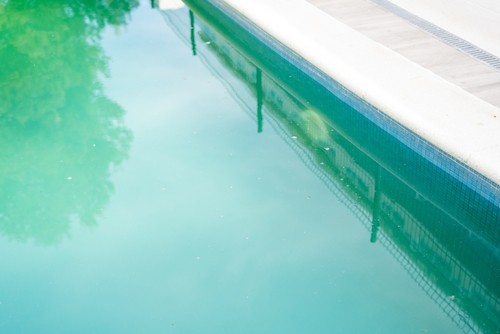
An efficient pool pump can significantly reduce energy bills. Older single-speed pumps can be energy hogs, while modern, variable-speed pumps are designed to be more energy-efficient.
Variable-speed pumps allow you to adjust the speed and energy consumption based on your pool’s needs. This flexibility can lead to significant energy savings over time.
Adhering to energy conservation regulations not only helps in reducing operational costs but also contributes to environmental sustainability.
Energy-efficient pumps often comply with these regulations, making them a wise choice for environmentally conscious pool owners.
Frequently Asked Questions
Pool Pump Maintenance Frequency
Pool pump maintenance frequency depends on several factors, including usage, pool size, and environmental conditions. Generally, it’s recommended to check and clean the pump basket weekly and conduct a thorough inspection of the pump at least once a year.
Common Reasons for Pool Pump Failure
Common reasons for pool pump failure include clogging due to debris, wear and tear of mechanical components, electrical issues, and improper water chemistry, which can lead to corrosion or scaling.
Environmentally-Friendly Repairs
Environmentally-friendly pool pump repairs involve using sustainable parts and materials, ensuring proper disposal of old components, and upgrading to more energy-efficient models.
Signs for Pool Pump Replacement
Signs that it might be time to replace the pool pump include frequent breakdowns, consistent performance issues, and the availability of more efficient pump models.
Risks of Neglecting Pool Pump Issues
Neglecting pool pump issues can lead to poor water quality, higher operational costs, potential health hazards, and damage to other pool equipment.
Swimming Pool Pump Repairs: Signs, Maintenance, and Troubleshooting – Conclusion
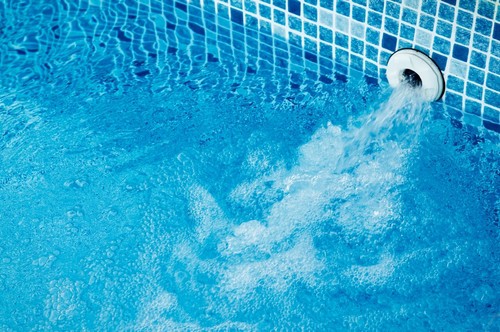
Proper care and maintenance of the pool pump are crucial for maintaining a clean, safe, and efficient swimming pool.
Recognizing the signs of pump issues, adhering to regular maintenance, and seeking professional assistance when necessary are key to ensuring the longevity and proper functioning of your pool pump.
Pool owners are encouraged to prioritize the health of their pool pump, promoting a sparkling clean and well-circulated swimming experience.
Are you seeking professional and reliable swimming pool cleaning or pool repair services in Singapore? Contact us today!

